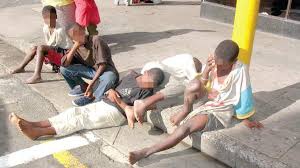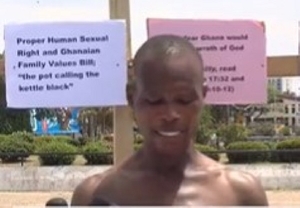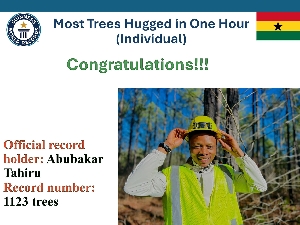The increasing rate of Streetism in Ghana is very alarming as in some essence, it threatens our country’s future economic growth, productivity status and security issues.
Aside the waste of the beautiful talents of these children who have resorted to street living for a reason or two, the issue again depicts how broken and damaged their emotions are and its implications on society.
A lot has been done by government, some officials, Churches, individuals and NGO’s in curtailing street-ism and despite ongoing projects by these agents and agencies, there is also the need for massive awareness creation and advocacy campaigns, to enlighten everyone on the need that exists and how we can together fight this issue as a country.
With over three years intensive work as a street worker with a Christian NGO (OM Ghana), I have witnessed the terrors of street living and just how these children survive, to me is still is a mystery I never had an answer to, even now. The trauma they face daily and its resultant cycle of violence in their lives and on others, the abusive treatments they receive from market women and shoppers, the rejections at the very early stage of their street life, the terrifying stories they share among others, all these are gradually developing a very serious unhealthy personality make –up which poses a dangerous threat to the security of “healthy” citizens in the country in few years to come.
Although it remains an undisputed fact that streetism cannot be completely eradicated looking at both the United Nations report that, there are over 140,000 to 200,000 children who for thousand reasons have left homes to live on danger filled city- streets, also the Ghana Statistical service reports over 5000 children living on the streets of Kumasi alone with about 3000 of them being Kayayes.
I still believe that appropriate intervention plans can be laid in place to help mitigate the dangers of streetism so we and our children in few years to come can live peacefully in our country Ghana.
The leading factor
Factors like poverty, broken homes, family conflicts, peer pressure, exploitations, stigma, kidnap and abuses are propelling factors that create the leading factor, Trauma, in the lives of these children.
It is the trauma from those unexpected happenings that lead children in finally moving to live on the street. With my engagement with these children for the past few years, I have been prompted on the damaging effects of giving little attention to traumatic events from happenings in our homes.
We all have being somewhat being survivors of minor traumatic events and could have also ended up on the streets.
God in His own wisdom has put in healthy structures like; attachment and bonding from parents to children (these come through touches, attention, eye to eye contacts from parents to children, affirmations, hugs, care), the feeling of belonging to a family (your identity), having all fundamental needs (shelter, parental care, food, protection, value, spirituality, knowing boundaries the consequences of breaking them in life, ect).
These structures are very crucial in the making of a child’s personality and if missing, trauma sets in and leads children into growing to become unhealthy adults of which society suffers greatly from their reactions and lifestyles. It is quite obvious the street cannot provide these structures for these children.
The Cycle of Violence
The five stages in the cycle of violence includes:
Violence stage, this comes through issues like broken homes, rape, death of a parent, poverty, famine and kidnap
Immediate loss stage the violence leads to some losses like parental care, education, good health, no protection, love, insecurity, broken trust etc
Exploitation stage, losses render the child vulnerable as she/he would be compelled to compromise in order to meets certain needs. She/he becomes exposed to sexual and physical abuses, child labor, trafficking, doing drugs, rape and the likes. Anyone at all can take advantage of them, for they lack confidence in themselves, inferiority complex sets in.
Long term Loss, when the child goes through these three stages, he loses respect and trust for anyone as a results of the pains and hatred through being exploited, others might have bad health from infections, some develop emotions that are seriously broken and damaged.
Violence, they end up abusing other people with the very abuse they went through, defilement, rapes, murder, attacks, and theft. They become very violent themselves.
The Complications
Possible threats
In one of my audit sections within ashaiman, our company vehicle was chased by radical young guys after our driver had jokingly refused paying monies for using the ghetto route because they claimed they had filled the pot holes up with sand.
Initially I perceived their reactions as a mere joke until I saw behind us, group of wild guys with sticks and buckets of water running towards our vehicle because obviously their other friend by our car had given signals in “pidgin” that we were stubborn. We however escaped this scene but with scratches on our car, I don’t know what actually was going to happen to us but I could sense it wasn’t going to be a child’s play.
I questioned the driver why didn’t give them the 2 cedis and he said “ these guys want to take everything by force, they keep using the sand filling as an excuse, I am fed up of paying for the same thing over and over again”
This is not to bruise healed wounds, but the issue with our late Hero Major Mahama is a clear picture of the effects of damaged emotions of unhealthy adults in communities and I won’t be surprised if they are proven to be victims of some traumatic cycle of violence in their lives, either than that I wouldn’t understand why a person would not value life and cross sensitive boundaries to satisfy his wrath by murder because no one has taught them life realities like losing your source of income and how we handle such issues in life. To the street child it is always about pleasing him/herself and no one else matters because none cares about them, in worse cases, even their own families have rejected them so what is their value.
In 2016, my former organisation rescued some 23 young prostitutes within the ages 13-17 years from the regional police quarters, Kumasi. We did our best in caring for them, they gave us tough times and I guess our best to them was not enough so they managed to escape. It was sad as we watched these young girls leave our safe house after two days of rescue because of inadequate resources and intervention plans as a result of finances.
Some three remained with us until the third month and they also left because they couldn’t bear with boundaries and structures because on the street they live life the way they want to and no one teaches them what is right or wrong. I bumped into one having a heated argument with an elderly women with crowd around them in Kejetia, and the next thing I saw was she angrily picked up coconut from a track of coconut behind her, and the guys around held her hand from hitting the elderly woman with the it.
I approached her and she recognized me, I did all I could to convince her in considering our safe house but she still rejected. This very one I spent time with, during our rescue mission and she was a victim of broken home and parental neglect, who has been pressurized by friends to move from home to stay around Asafo and was involved in prostitution at age 15. She disclosed sleeping with at least two males each night to be given 20gh.
The 23 young prostitutes were so naïve that they had not even thought of the medical history of the “trotromates” and men they service at night. All they knew was getting more money from having unprotected sex with clients, they just didn’t care about the consequences. Another at age 16 was four months pregnant and doing prostitution with it, I asked if she even cared about unborn baby and she told me “that will even make my baby stronger and besides the pregnancy is still young, I will stop when my stomach protrude”. I thought of the many soul ties and spiritual make-up of the unborn baby.
These are not fabricated stories or whatsoever, they are real ones from engaging street children for three years, it is no joke, and something needs to be done and done quickly. Or else I fear that our innocent healthy children that we are sacrificing a lot to give them future will be attacked by the children of these street children in their own homes. When there is a spill over, we bear the consequences too, streetism needs to be given maximum attention and appropriate intervention plans must be set in place to help in the restoration process of these survivors of street life.
Way forward
A good intervention plan in a holistic way with all agents of change like the schools, church, government bodies and NGO on board will go a long way in helping curb certain adverse dangers of streetism in Ghana.
Writer: Portia Amoateng
Tradewinds Company.













